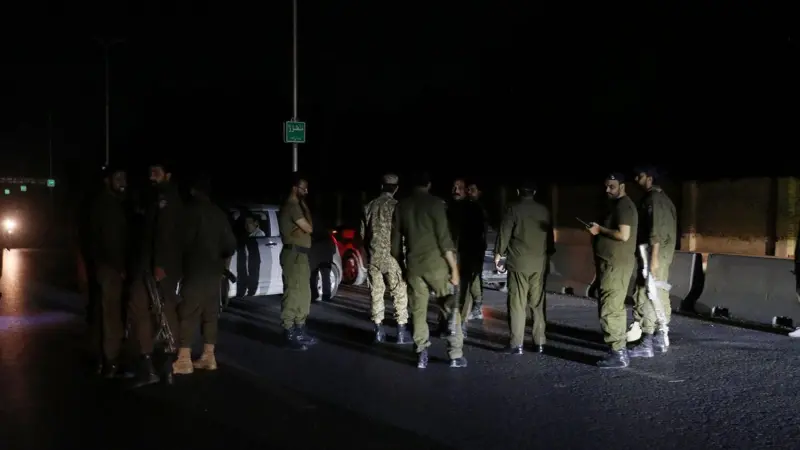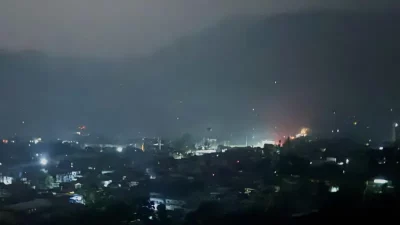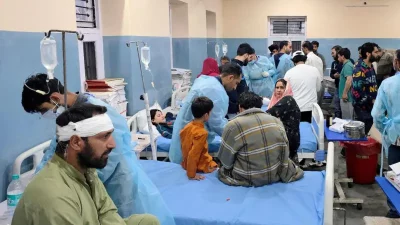
Pakistan military claim that India has attacked the country again at dawn on Saturday (10/5), launching missiles against three of its air bases.
In a state-owned statement, Lieutenant General Ahmed Sharif Chaudhry stated that the country’s air defense system had been able to intercept most Indian missiles, but three had been able to pass and reached three bases, including Nur Kahn, in Rawalpindi, headquarters of the country’s military headquarters, which is about 10km from the capital, Islamabad.
Chaudhry warned of India to wait “for our answer.”
The Pakistani Army Public Relations Department said the country is launching a counter-profile, which was called “Operation Banyan Marsus.”
The Indian government has not yet spoken out about the accusations. In recent hours, the country’s airport authority has communicated the closure of 32 airports in the north and west of the territory until the morning of May 15.
The episode raises the fears of a war between the two nuclear powers.
The tension between India and Pakistan in Caixemira, border region claimed by the two countries for decades, has been scaling since India attacked last Wednesday (7/5), several points of Pakistan and the Islamabad Caxemira area, killing 31 people and injuring 57, according to the Pakistani authorities.
According to India, the operation was a response to the attack, weeks earlier, by militants against Indian tourists near the city of Pahalgam, Caxemira Indiana – Pakistan denied involvement.
Caxemira has been living in a fragile and unstable situation for decades, divided by a conflict that has made thousands of victims.
The territory is claimed by both India and Pakistan, two countries that have nuclear weapons.
Mosque hit by Indian missile in the Caxemira region administered by Pakistan | Reuters
Tension climbing
In the offensive on May 7, India claimed to be acting in retaliation of the April 22 attack that killed at least 26 people, most of them, near the picturesque city of Pahalgam, in the part of India.
The country claims to have “evidence that point to the clear involvement of external terrorists based on Pakistan” in the attack. Pakistan denied any connection with what happened.
Militants opened fire on visitors in the Baisaran Valley, a region of prairie sought by nature.
Some of the survivors said that Hindu men were specific targets of the gunmen.
Pakistan denied involvement in the attacks, but the Indian police claim that two of the four suspected militants were Pakistani citizens.
Indian security forces are still pursuing the suspects. Indian Prime Minister Narendra Modi even said that the country would pursue them “until the ends of the land.”
Since the tragedy, both India and Pakistan had been announcing measures of mutual retaliation, including the closure of borders and the suspension of a river water sharing treaty. Troops on both sides had already exchanged shots with small weapons.
Sindoor Operation
According to the Indian government, the attacks took place under the “Operation Sindoor” and aimed at the terrorism infrastructure in Pakistan and Caxemira administered by Pakistan, where terrorist attacks against India would have been planned.
“Our actions were focused, considered and were not intended to climb. No Pakistani military installation was attacked. India showed considerable restraint in the selection of targets and the method of execution,” the Indian government said at the time through a statement.
A Pakistani military spokesman said that Islamabad would respond “at the time and place of his choice.”
“All our fighters are in the air. This is a shameful and cowardly attack from Indian airspace,” added the spokesman.
 City of Muzaffabad after the attack on May 7 | Reuters
City of Muzaffabad after the attack on May 7 | Reuters
India accuses Pakistan of supporting transionic terrorism, something that the Pakistani government denies.
Caxemira, a mountainous region south of Himalayan, has been the target of a long conflict – and two wars – between the two nuclear powers.
The problems began in 1947, with the partition of the southern Asia region hitherto colonized by the United Kingdom in two countries, Pakistan and India.
The former principality of Caxemira has been left out of the division and has since been disputed by both nations (learn more below).
International reaction
Asked about the attacks of May 7, US President Donald Trump lamented what happened: “I just hope that will soon.”
US Secretary of State Marco Rubio said in the X (The Old Twitter) that would monitor the situation closely.
The Indian Embassy in the USA even reported that India National Security Counselor Ajit Doval had talked to Rubio “and the informed about the measures taken.”
Rubio said he agreed with the US President’s comments and hoped that “this will end quickly.”
He also said he would continue to dialogue with the Indian and Pakistani leaders “for a peaceful resolution.”
A spokesman for the United Nations Secretary-General António Guterres said at the time he was “very concerned about Indian military operations.”
“He [Guterres] asks for the maximum military containment of both countries. The world cannot afford to luxury a military confrontation between India and Pakistan. ”
United Kingdom Foreign Secretary David Lammy stated that current tensions between India and Pakistan are a “serious concern.”
“The UK government urges India and Pakistan to show containment and engage in a direct dialogue to find a quick diplomatic path,” he said in a statement.
Lammy said the United Kingdom has a close and unique relationship with both countries: “I made it clear to my colleagues in India and Pakistan that if it gets worse, no one will win.”
Russia’s Foreign Ministry has stated in a statement that it is “deeply concerned about deepening military confrontation.”
“Russia vehemently condemns acts of terrorism, opposes any of its manifestations and emphasizes the need to join the efforts of the entire international community to effectively combat this evil,” the statement says.
 India reinforced security scheme after attack that killed 26 tourists | Getty Images
India reinforced security scheme after attack that killed 26 tourists | Getty Images
‘Dramatic climbing’
Anbarasan Ethirajan, Southeast Asian editor of the BBC world service, classified the situation as a “dramatic climbing” and recalled that the two rivals have nuclear weapons.
“Although there were expectations that India could launch some kind of military action, the intensity of missile attacks within Pakistan surprised many,” he writes on the events on May 7.
“India states that some of the bombarded places were linked to militants, and that they had no target Pakistani military facilities. Pakistan promised retaliation, and the nature and targets of this retaliation will determine Delhi’s counter-reaction.”
“Both countries believe they can manage climbing, but tensions are high and it is difficult to predict the course of any military conflict.”
Ethirajan pointed out that in the past, the US and other countries intervened to contain tensions in the region.
“With the focus of the Trump government diverted to other global issues, it remains to be known to quickly Washington will intervene to appease the situation. Political leaders in both countries will want to show the public that they have acted decisively and claiming victory,” says the editor.
Already Jeremy Bowen, BBC International editor, pointed out that India and Pakistan know what is at stake in a resumption of conflict.
“It will take a great diplomatic effort to prevent tensions from intensifying,” he anticipated.
 People who, according to their relatives, were injured in a transfronic bombing in the URI sector receive treatment in a hospital in the region of Caxemira administered by India. | Reuters
People who, according to their relatives, were injured in a transfronic bombing in the URI sector receive treatment in a hospital in the region of Caxemira administered by India. | Reuters
Conflict history
Since the creation of states in 1947, India and Pakistan have crashed multiple wars – mostly cash -centered.
The first broke out a few months after the founding of both countries, and ended in a UN mediated ceasefire in 1949.
The region was divided, but the two nations continued to claim total control of the territory.
In 1965, the conflict resumed when the Pakistani forces crossed to the cashmir administered by India, which generated fierce land and aerial battles.
In 1971, the war broke out in East Pakistan, where India supported the forces of independence, which led to the creation of Bangladesh.
Kargil’s conflict in 1999 saw Pakistani troops infiltrate the cashmire managed by India. It was the first confrontation between the rivals with nuclear weapons, which generated a global alarm.
In recent years, tensions have increased after actions by militant groups: India launched “surgical operations” in 2016 following a URI attack and performed military actions near Balakot in 2019 after a Pulwama bombing.
Pakistan responded with aerial raids, which marked one of the most dangerous climbs in two decades.
Originally published by BBC on 09/05/2025
Source: https://www.ocafezinho.com/2025/05/10/paquistao-diz-que-vai-retaliar-apos-acusar-india-de-novo-ataque/

